Leon Tang ’26, information systems, Oluwatimilehin Olayinka ’26, information systems, Dale Neumeister ’25, information systems, and Christopher Humbert ’25, computer science, recently won the University of Maryland’s Info Challenge 2024 award for Outstanding Cybersecurity Project. This annual week-long competition brings together college students from UMD, UMBC, Montgomery College, and the US Naval Academy to tackle real-world problems in the areas of data analytics, security, and design. The challenges were provided by Ernst & Young, US Department of Agriculture, UMD Office of Sustainability, VerticalApps/Mind Petal, Air National Guard, and GreenStar, Inc.
In this Q&A, the team took the time to talk to us about how they first became interested in cybersecurity and share details on what they worked on during their Info Challenge project. They leave us with advice for undergraduate students looking to get involved in the field and share their upcoming plans for the student organization Information Systems Security Association, UMBC Chapter.
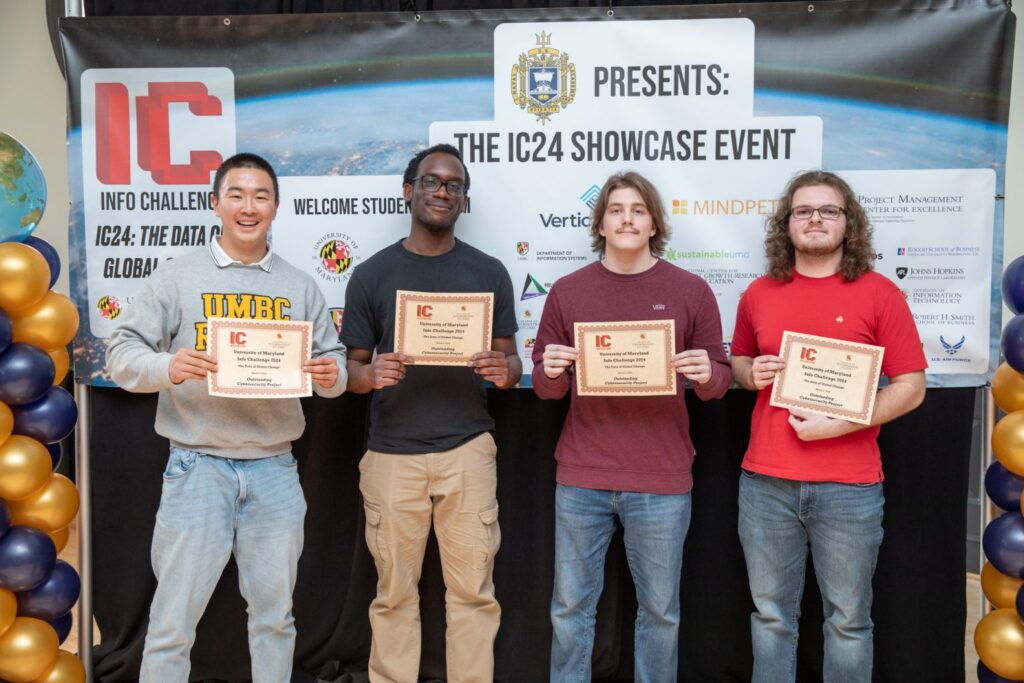
Information Systems: Can you introduce yourself and state why you chose your program of study?
Leon Tang: I am an information systems major at UMBC and I chose to do this program because of my interest in the evolution of technology in the world we live in today.
Oluwatimilehin Olayinka: I am a current sophomore in the Information Systems program. Ever since I was young I’ve had an interest in technology, specifically computers, due to my love of gaming and the influence of my father who was also in the tech field.
Christopher Humbert: I am a computer science major at UMBC. I chose the field of computer science because I like problem-solving and the feeling of building something from nothing. The nearly limitless potential to create whatever you want program-wise is very fulfilling and fun.
Dale Neumeister: I am a current junior at UMBC. I started studying Information Systems halfway through college and it was the best decision I ever made. This field of study interests me because I enjoy learning about how day-to-day operations work in almost every corner of the technological world.
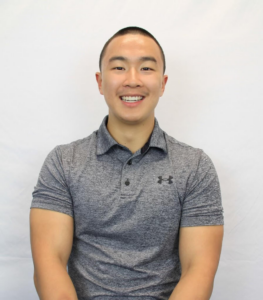
Information Systems: When did you first become interested in the field of cybersecurity and what motivated you to continue learning about it?
Leon Tang: I became interested in the field of cybersecurity during my freshman year at UMBC because of the importance of keeping digital information safe. As the world of technology increases, cyber threats increase as well. The challenges of cyber threats and the opportunity to contribute to a safer digital world motivated me to learn about it.
Oluwatimilehin Olayinka: I first became interested in cybersecurity due to a course I took in high school. It was an introductory class for JavaScript and one of the assignments I worked on mentioned the guidelines and protocols in the development of web applications. After this, a relative told me about the CompTIA certification tests, one of those being security+. I decided to take this and was very interested in the content and work opportunities in the field.
Christopher Humbert: I was vaguely interested in cybersecurity when I first started studying computer science at UMBC. Participating in UMD’s Info Challenge 2024 sparked my curiosity about the subject. Working on the project and the posed questions is what motivated me to continue learning about it.
Dale Neumeister: When I was in high school I took some computer science courses and that was the first time I was introduced to cybersecurity. I researched different aspects of it but had never worked on a project regarding cybersecurity before. The Info Challenge was a great experience to engage my desire to learn more about it.
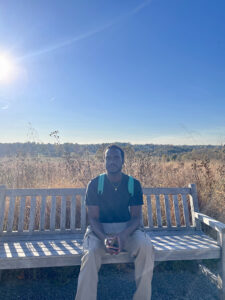
Information Systems: You were recently awarded the Outstanding Cybersecurity Project at UMD’s 2024 Info Challenge. Can you tell us about your experiences during this week-long project and provide an overview of the project you worked on including the goals and objectives?
Leon Tang: Our project focused on identifying cybersecurity vulnerabilities by analyzing Ernst & Young’s (EY) authentication logs for unusual patterns and risks. The goal was to improve security by thoroughly reviewing and understanding the data. This included detecting failed logins and determining risks connected to post-termination and unmatched login attempts. In doing this project, the group had to be flexible and make the time to work together while balancing school work. It was an intensive week filled with data analysis where we successfully applied many techniques to present critical insights that helped improve EY’s cybersecurity methods.
Christopher Humbert: We had to analyze an employee roster and a million lines of login data to find vulnerabilities in the system. Both data sets were contained in CSV files, so I decided to write code to tackle some of the questions. I worked solely on writing a C++ program to help assist in answering questions about the security of the organization. I used an employee roster and data structures (hashtables & vectors) to create objects for each employee and created functions to help deal with login information data. The main objectives my code identified/found were the number of total logins for the company, total logins for each employee as well as their login pass/fail rates, logins from non-employees, and higher than average failure rate days (possible cyberattacks). The code also identified the location discrepancies between logins (logins significantly farther away from previous logins, considering time), employees who attempted to log in after being terminated, inactive employees, and missing log numbers (logs deleted by employees). I compared my results with those attained by my other groupmates to ensure we were on the right track. It was challenging balancing working on the project and school at the same time, but it was worth it.
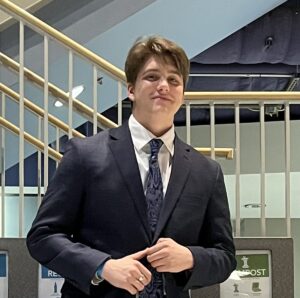
Information Systems: What strategies, methods, or unique aspects of your project do you think set it apart from others?
Leon Tang: Our project used advanced data structures in C++ with Microsoft Excel analytics to identify and analyze cybersecurity vulnerabilities in EY’s login data. We used sophisticated frequency analysis, failure detection, and pattern recognition to reveal abnormal login patterns and security breaches. This combination of data visualization and coding allowed us to present our findings in a clear and impactful way to set our work apart by connecting technique analysis with user-friendly designs.
Christopher Humbert: I believe using C++ and multiple approaches to find solutions to the posed questions is what set us apart. As far as I could tell, I was the only person in the challenge to use C++. We also used a variety of insightful diagrams and Excel graphs/tables to show discrepancies in the data.
Dale Neumeister: I believe that an underrated part of the challenge that we excelled at was teamwork. We knew each other coming into the challenge so we did not have to spend time getting to know each other’s strengths and weaknesses. We started by devising a plan and stuck to it until the end with communication and accountability.
Information Systems: Can you talk about how you learned about the Info Challenge competition and what steps you took individually and as a team to prepare for it?
Leon Tang: I found the Info Challenge through an email from our school and quickly reached out to a group I regularly collaborate with on school projects to see their interest. As the team leader, my responsibilities included motivating our group, setting goals, designing the presentation slides, leading the presentation, and delegating tasks according to each team member’s strengths.
Oluwatimilehin Olayinka: Leon informed me about the Info Challenge. Originally, I was not interested in partaking as I had never done something like it before. However, after some time, he convinced me to join. I had no idea what the challenges would entail so I honestly went into it blind.
Christopher Humbert: I learned about the Info Challenge through my groupmate Dale who learned about it through Leon. They had asked me if I wanted to participate with them and I agreed. Individually, I had started planning for it by thinking of initial ways to analyze the large amount of data quickly and efficiently. We were not allowed to work on the project until the kickoff date so that was the most I could do.
Dale Neumeister: I saw the announcement through my email and Leon knew we would do great if we all worked together. We set deadlines and made sure to get the work done. The deadlines helped us analyze our findings and make solid conclusions on improving the log-in system that was given to us.
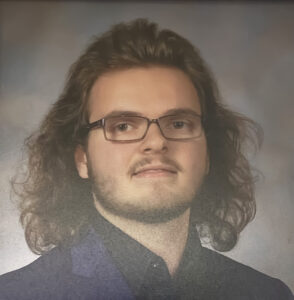
Information Systems: How do you see the field of cybersecurity evolving in the future and what opportunities or challenges do you anticipate for companies and organizations dedicated to safeguarding our data?
Leon Tang: The field of cybersecurity is bound to become important as our reliability on digital technology increases. I anticipate evolution in artificial intelligence and machine learning to improve threat detection and capabilities. However, this evolution also creates challenges such as organizations needing to regularly update their security methods to combat more vulnerable threats. Companies will need to invest more in both technology and skilled individuals to protect data and maintain consumer trust in a growing digital age.
Christopher Humbert: I predict AI will help revolutionize cybersecurity. AI could be a very helpful tool to identify possible attacks and stop them quickly. I don’t think we’re there yet, but, as AI becomes more accurate and advanced I think anything is possible. That being said, AI could also pose a threat to organizations the more advanced it gets. Overall, we need competent people behind the helm of these innovations.
Dale Neumeister: I believe that cybersecurity is already involved with just about everything, whether that’s a cloud network or even someone’s house. Cybersecurity isn’t going anywhere any time soon so there is only room for growth. As people’s lives continue to develop online there will only be an increasing need for protection.
Information Systems: What are your short and long-term plans once you graduate?
Leon Tang: I hope to attend graduate school after my undergraduate degree at UMBC as I am in the combined BS/MS program for Information Systems. My career goal is to become an IT Project Manager and I believe furthering my education will provide me with the skills needed to excel in this role.
Oluwatimilehin Olayinka: Currently, my plan is to go into the workforce after graduation. Recently, however, I have been considering continuing my education in a graduate program. I am still considering whether this would be a Master’s in Information Systems or another discipline like Linguistics.
Christopher Humbert: My short-term plans are to finish school and try to get a job in AI. If possible, I want to come back for a Master’s degree. As for my long-term plans, I really hope to do research into AI or related subjects and/or build my own AI model.
Dale Neumeister: My current plan is to continue to do well in school while building my resume to land an internship that interests me. I hope to make a good impression throughout my internship experience to possibly return to that company and work my way up from there.
Information Systems: What advice would you give undergraduate students interested in being involved in projects or competitions about cybersecurity or related fields?
Leon Tang: If you are a student looking to do projects in cybersecurity or in related fields, I would say start making connections by joining clubs or groups on campus. These places are great for networking, learning from others, and finding mentors. Also, if you are given an opportunity to do projects outside of academics, do them to build the necessary skills and experience. Lastly, take risks as they are essential for your growth.
Oluwatimilehin Olayinka: My advice is that there is no better time to start than now. Before, I felt that I was not qualified or skilled enough to participate in these types of projects, but I have now realized that the best way to learn what you want to do is by doing it.
Christopher Humbert: It never hurts to participate, so just try it and see where it goes. If you make something you’re proud of, that’s all that matters. You can make a lot more connections with like-minded people doing this too.
Dale Neumeister: My advice to undergraduate students, especially lowerclassmen, is to get involved early. Not only are projects and clubs a good way to build your resume, but they also enhance your understanding of the field and allow you to figure out what you are truly passionate about. The best way to gain experience is to do it and there’s no better time than the present.
Information Systems: The Information Systems Security Association, UMBC Chapter, recently announced their new executive board for the Fall 2024 – Spring 2025 academic year. Leon Tang is taking over as the President and Dale Neumeister as the Vice President of Communications. Can you talk about your responsibilities in the new role and what you are most excited about for the upcoming year?
Leon Tang: As the newly appointed President of the Information Systems Security Association (ISSA) at UMBC, my main duties involve managing the organization’s day-to-day activities and developing opportunities for students’ passion for technology and cybersecurity. I’ll be working closely with officers like Dale Neumeister, our Vice President of Communications, to improve our outreach efforts. I’m really looking forward to expanding our network by collaborating with industry experts which will offer our tech community at UMBC incredible opportunities for learning and professional growth.
Dale Neumeister: As the upcoming Vice President of Communications for the Information Systems Security Association Chapter at UMBC, I will work closely with my fellow board members to keep in contact with community members to increase our reach. This will be done in two main ways. The first way is to grow the club by finding new passionate members looking for new opportunities. Another way is by finding new connections. We will bring guest speakers to talk to our members and provide them with guidance and education about the security field or any other areas of expertise our guests are willing to share. I’m excited for next school year so we can continue to make a difference.